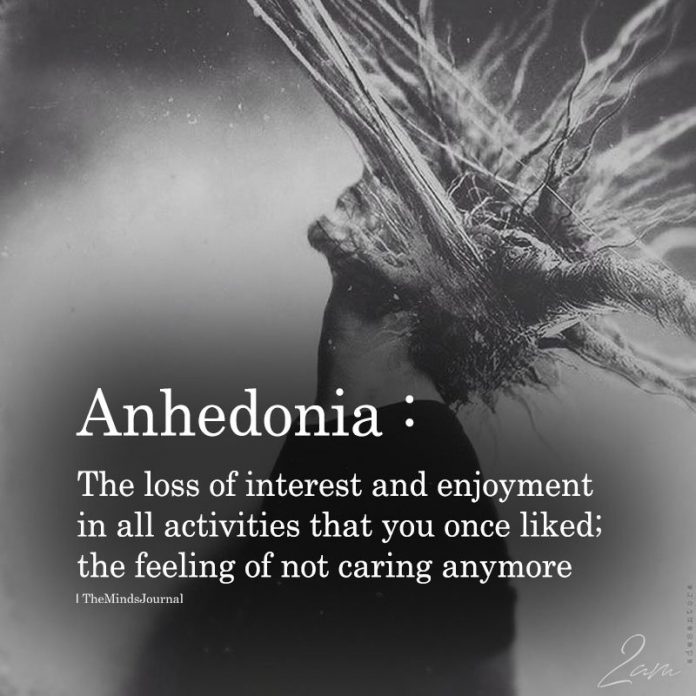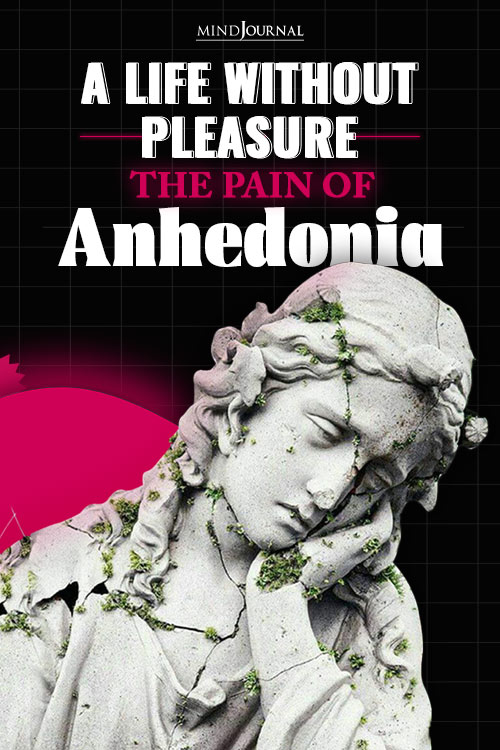“We Anhedonians have adapted to long periods between good news. Our national animal is the hope camel. We have no national bird. All the birds are dead.” ― Colson Whitehead
- Anhedonia, or an inability to feel pleasure, can manifest as a reduced desire and reduced motivation to engage in activities that were once pleasurable.
- Feelings of anhedonia may be maginified by seasonal affective disorder or by anxiety related to the coronavirus.
- Seeking new opportunties for moments of brightness and joy could lessen the effects.
Located somewhere between sadness (when your life isn’t going the way you want it to) and depression (when you can’t get out of bed) is the pit of anhedonia. Simply described, it is the inability to feel pleasure, but that hardly covers the entirety of this seldom-discussed disorder.
Anhedonia can refer to reduced desire and reduced motivation to do anything. People can experience these symptoms in varying degrees: Some get no pleasure from being with other people; others may feel lonely yet want to hide.
We all want to feel good, but people who suffer from anhedonia just can’t, and that makes their depression worse. Yet there is hope for hopelessness on the horizon, and it’s within your own walls if you can find the desire to let in a little sunshine. Literally opening the window shades is a very good place to start, right where you are as you read this.

If you live in a place where winter snow or just a lot of rain makes life dreary, your anhedonia may be driven by seasonal affective disorder (SAD). Letting in some warmth and light could increase your willingness to take in a tiny bit of joy. I like it when I see the sun shining off the water, and I have learned to take it in when I see it. That may be the first step in beating this silent scene-stealer into submission.
Related: What To Do If You Are Depressed: A 15-Step Guide
Just be willing to let in a little bit of the good. You don’t need to even feel it at first, but it will help to start noticing things that you remember you used to think were nice, like sunsets, fresh food, and flowers, cooking, and eating. Some people with anhedonia don’t even enjoy food but just eat to alleviate hunger; when such natural pleasures are subdued, it can be very sad.
This is different from the struggle to find joy in our current pandemic world, although many are feeling similar symptoms because of it. COVID has created depression and anxiety all its own: coronaphobia. For many, what used to bring joy is just not available right now, but that will change.
Pandemic isolation actually might not be affecting people with anhedonia as much as those who have been very socially and creatively engaged. Unfortunately, with anhedonia, even the thought of getting the vaccine, seeing family, and going out again brings no pleasure.
Whether you are suffering because of the pandemic or from long-term struggles with anhedonia, however, the answers are the same. If you are feeling down in the pandemic, you have to forget about what’s normal and look for the new. Life may not be like it used to be or, more accurately, how we want it to be for a very long time, if ever. The same goes for those afflicted with anhedonia: It’s necessary to start with the little things.
Just be willing to look for them. If you open your heart just that much, you will find things to make you smile, and when that happens, notice it and take it in. The more you do, the easier it gets, and a little more joy may come your way.
We can’t ever expect joy to be a constant in our universe, and even before the pandemic, joy was never a constant. But if you are suffering from anhedonia, the joy that is there for you in the world is just a little harder to find.
So here’s an idea that could work for all of us: Let’s make 2021 about looking for those little moments of joy. You may want to write them down or, like my wife, video or take pictures of them. Yes, in the beginning, you will almost have to force yourself, but you will see, sooner than later, that doing this helps.
Related: 6 Ways To Boost Serotonin Naturally Without Medication
All those little moments add up and become powerful enough to make you want to feel the joy more. Give it a chance. The way you feel won’t change overnight, but it will change, and you will feel better.
Written By Barton Goldsmith Originally Appeared On Psychology Today









Leave a Reply
You must be logged in to post a comment.